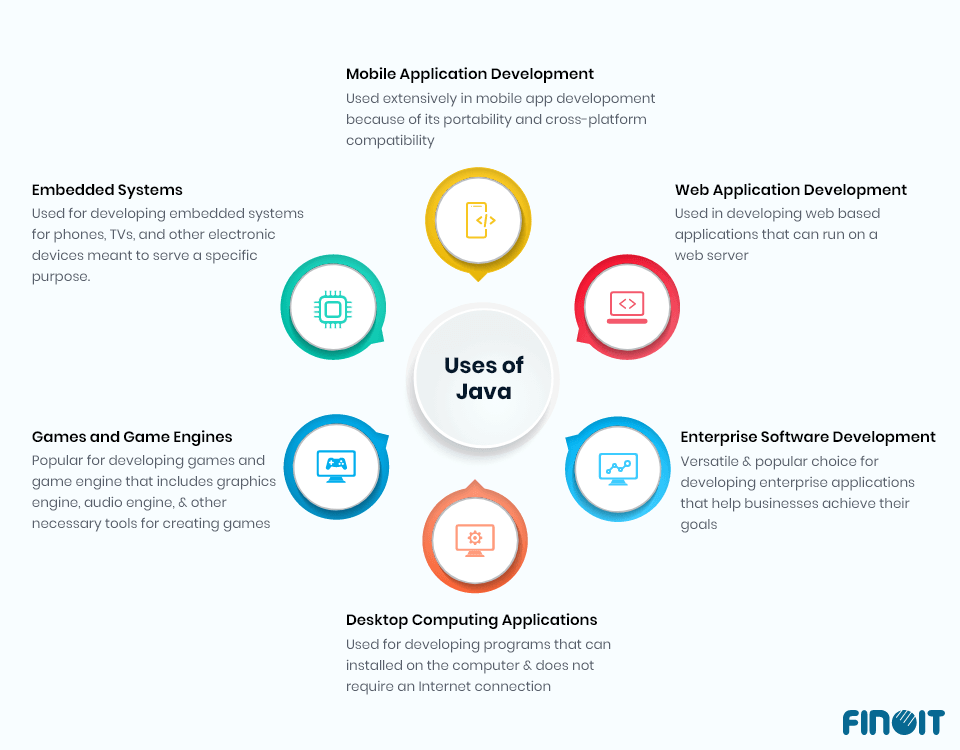Why You Should Learn Java in 2024?

Java remains one of the most robust and versatile programming languages in the world. With its vast array of applications and enduring popularity, learning Java in 2024 can significantly enhance your career as a software engineer. This blog post delves into why Java is still relevant, its applications, and how mastering it can benefit you.
History and Evolution of Java

Java was created by James Gosling and his team at Sun Microsystems in 1995. Over the years, it has evolved significantly, adapting to new technologies and methodologies while maintaining its core philosophy of "write once, run anywhere." This evolution includes major updates like Java 2 (1998), Java SE 5 (2004), and the more recent Java SE 17 (2021). Each version brought improvements in performance, security, and functionality, making Java a powerful tool for modern software development.
Java's popularity is reflected in its widespread usage. According to the TIOBE Index, Java consistently ranks among the top three programming languages. It is estimated that there are over 9 million Java developers worldwide. This vast community means a wealth of resources, forums, and user groups that can provide support and collaboration opportunities.
Java in the Job Market
Let's take a look on some numbers, and analyze what is the demand for Java developers in 2024.
High Demand for Java Developers
The demand for Java developers remains robust in 2024. According to the U.S. Bureau of Labor Statistics, employment of software developers is projected to grow 22% from 2020 to 2030, much faster than the average for all occupations. Many industries, including finance, healthcare, and technology, rely heavily on Java for their backend systems and enterprise solutions. This high demand translates to numerous job opportunities and job security for Java developers.
Competitive Salaries
Java developers are well-compensated for their skills. The average salary for a Java developer in the United States is around $105,000 per year, with experienced professionals earning upwards of $130,000. This competitive salary range makes Java an attractive language to learn for those looking to advance their careers in software engineering.

Java’s Versatility and Applications
But you may ask, why Java is so powerful, and relevant in 2024? I say "good point", and let's take a look on the reasons it is so popular in the industry.
Cross-Platform Capabilities
One of Java's most significant strengths is its cross-platform capabilities. The Java Virtual Machine (JVM) allows Java applications to run on any device that has a JVM installed, making it an ideal choice for developing cross-platform applications. This capability is particularly useful in an era where software needs to operate seamlessly across various devices and operating systems.
Enterprise-Level Applications
Java is a preferred language for enterprise-level applications due to its scalability, reliability, and robustness. Major companies like Amazon, Google, and LinkedIn use Java for their backend systems. These enterprise solutions often involve complex transactions, data processing, and integration with other systems, areas where Java excels due to its strong performance and security features.
Java in Web Development
Java is also a popular choice for web development, particularly for backend services. Frameworks like Spring and Hibernate have made it easier to develop robust, high-performance web applications. Spring, for instance, simplifies the development of secure, scalable, and maintainable applications, making it a go-to framework for many developers.
Java in Android Development
Java has long been the primary language for Android app development. Although Kotlin has become popular in recent years, Java remains a fundamental language for Android developers. Many existing Android applications are built with Java, and a solid understanding of Java is essential for maintaining and updating these applications. Furthermore, Java's vast libraries and tools make it easier to develop, test, and deploy Android apps efficiently.
Java in Cloud Computing
The rise of cloud computing has opened new avenues for Java developers. Java's platform independence and scalability make it an excellent fit for cloud-based applications. Many cloud service providers, such as Amazon Web Services (AWS), Google Cloud Platform (GCP), and Microsoft Azure, offer robust support for Java. Java's compatibility with microservices architecture also enhances its utility in developing scalable and flexible cloud applications.
Java’s Robust Performance and Security
In previous section, we have took a brief look on how Java is used in the industry, but let's go through some of Java's features, that also put it ahead of competition.
High Performance
Java is renowned for its high performance, particularly in large-scale and enterprise applications. This is largely due to its Just-In-Time (JIT) compiler, which translates Java bytecode into machine code at runtime, optimizing the execution process. This ability to perform well in demanding environments makes Java a preferred choice for many high-traffic websites and complex systems.
Java also excels in memory management through its automatic garbage collection. This feature helps developers avoid memory leaks and optimize the application’s performance, ensuring that resources are efficiently managed and that the system remains responsive under heavy loads.
Security Features
In today’s digital landscape, security is paramount. Java has robust built-in security features that help protect applications from a wide range of threats. These features include:
- Bytecode Verification: Ensures that code adheres to Java's safety and security standards before execution.
- Sandboxing: Restricts what Java applications can do, providing a secure environment for running code.
- Security Manager and APIs: Allows developers to define security policies and manage access controls within applications.
These features make Java an excellent choice for developing secure applications, especially those handling sensitive data or requiring stringent security measures.

Learning Java
Abundance of Learning Resources
Java’s popularity means there is no shortage of learning resources available. Whether you are a beginner or an experienced developer looking to enhance your skills, you can find a plethora of books, online courses, tutorials, and documentation. Some notable resources include:
- Books: "Effective Java" by Joshua Bloch, "Java: The Complete Reference" by Herbert Schildt.
- Online Courses: Platforms like Coursera, Udemy, and edX offer comprehensive courses on Java.
- Tutorials and Documentation: The official Java documentation and tutorials on websites like GeeksforGeeks provide valuable insights and practical examples.
Strong Community and Support Networks
Java boasts one of the largest and most active developer communities. This strong community support is invaluable for learning and troubleshooting. Forums like Stack Overflow, Reddit’s r/java, and numerous Java user groups offer a platform to ask questions, share knowledge, and collaborate on projects. Additionally, Java conferences and meetups provide opportunities for networking and learning from industry experts.
Future-Proofing Your Career with Java
Emerging Technologies and Java
Java's adaptability ensures it remains relevant as new technologies emerge. It plays a significant role in cutting-edge fields such as artificial intelligence (AI), machine learning (ML), and the Internet of Things (IoT). For instance, frameworks like Deeplearning4j facilitate the development of deep learning applications in Java. As these technologies continue to evolve, Java’s robust performance and versatility will keep it at the forefront of innovation.
Continuous Evolution and Updates
Java's regular updates ensure it remains a modern and efficient programming language. The Java community, led by Oracle and the OpenJDK project, consistently works on improving the language and its ecosystem. Staying updated with these changes can significantly benefit your career, as it ensures you are using the latest features and best practices. By learning Java in 2024, you are investing in a language that continues to grow and evolve, offering long-term career stability.

Conclusion
Learning Java in 2024 is a strategic move for any aspiring software engineer or seasoned developer. Its enduring popularity, robust performance, and versatility make it an invaluable skill in the tech industry. Whether you aim to develop enterprise-level applications, dive into Android development, or explore cloud computing, Java provides a solid foundation. With abundant resources, a supportive community, and promising career prospects, mastering Java can significantly enhance your developer skills and open up numerous opportunities in the ever-evolving tech landscape.
FAQ
Is Java still worth learning in 2024?
Absolutely. Java remains one of the most widely used programming languages in the world. Its applications span from enterprise solutions to mobile apps and cloud computing. The demand for skilled Java developers continues to be strong, making it a valuable language to learn for job security and career growth. Moreover, Java’s continuous evolution ensures that it stays relevant and incorporates modern programming paradigms.
How long does it take to learn Java?
The time it takes to learn Java can vary depending on your background and learning resources. Here’s a general timeline:
Beginner Level: 1-3 months (basic syntax, control structures, and simple programs)
- Intermediate Level: 3-6 months (object-oriented programming, data structures, and standard libraries)
- Advanced Level: 6-12 months (frameworks like Spring, Hibernate, and advanced concepts like concurrency and networking)
Consistent practice and real-world projects can accelerate the learning process. Online courses, coding bootcamps, and hands-on tutorials can also provide a structured learning path.
What are the prerequisites for learning Java?
While there are no strict prerequisites for learning Java, having a basic understanding of programming concepts can be beneficial. Familiarity with:
- Basic Computer Science Concepts: Understanding of algorithms, data structures, and software design principles.
- Prior Programming Experience: Experience with another programming language (like Python or C++) can make the learning process smoother.
- Problem-Solving Skills: Logical thinking and problem-solving abilities are crucial for programming.
Java is beginner-friendly, and many resources start from the basics, making it accessible to those new to programming.
Can I learn Java without prior programming experience?
Yes, you can. Java is considered one of the more accessible programming languages for beginners due to its straightforward syntax and extensive documentation. Many educational resources are tailored for absolute beginners, starting with fundamental concepts and gradually introducing more complex topics. Online platforms like Codecademy, Coursera, and Udemy offer beginner-friendly courses that require no prior programming knowledge.